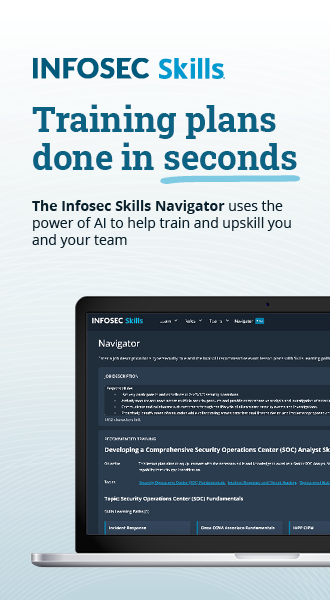How to get into cybersecurity: Essential skills & entry jobs
If you're bored at your job or work in a shrinking industry, it may be time for a career change. Cybersecurity jobs can be rewarding, are in growing demand and offer numerous technical and non-technical career paths. Cybersecurity professionals defend computer systems, investigate cyber incidents, manage risk and compliance, hunt for vulnerabilities and more.
Pathways into this industry are as diverse as the job titles, and we’ve uncovered some of the best entry-level cybersecurity jobs you can pursue. Read on for essential guidance about how to get a cybersecurity job, outlining everything you need to snag the right cybersecurity beginner role, including entry-level cybersecurity requirements, key skills and certifications.
How do you land security jobs with no experience? Well, you need to get some! But that doesn’t have to be a job. It can be a project, a home lab, volunteer work — or the unique experience you bring from a previous career. You can couple these unique experiences with a Cybersecurity Foundations Immersive Boot Camp to help develop career-ready skills in classes taught by industry experts. Another popular track is to start at a help desk providing support and work your way up — but those aren't the only ways.

FREE role-guided training plans
Before we dive into the article, I wanted to share two free ebooks our team put together to help you on your career journey. We hope they help!
- Entry-level cybersecurity careers you should consider
- Which entry-level certification is right for you?
Essential skills for cybersecurity
Cybersecurity is a multidisciplinary field requiring a mix of technical and soft skills, depending on the role. Below are some skills needed for entry-level cybersecurity positions that may significantly benefit those looking to break into the industry:
- Interest in computers and tech: Whether working in a security operations center (SOC), performing digital forensics investigations, securing cloud infrastructure or analyzing risk, you will be in and around technology — a lot. You may want to look elsewhere for a career if you’re not at least tangentially interested in one or more related areas.
- Understanding of computer networks: Before defending a network, you must understand how it works, including knowledge of TCP/IP, network protocols and routing and switching. This is a foundational skill that can help across numerous roles.
- Basic programming knowledge: Not every role requires programming knowledge, but understanding the basics of languages like Python, C++, or Java is helpful when automating security tasks, analyzing malicious code or identifying software vulnerabilities.
- Problem-solving skills: Cybersecurity often involves identifying and fixing problems. Strong problem-solving skills are among the top traits cybersecurity hiring managers look for in candidates.
- Attention to detail: Cybersecurity boils down to managing risk, and attention to detail and process is a requirement for many key roles. Being meticulous and detail-oriented helps you spot irregularities others might overlook.
Popular entry-level cybersecurity jobs
Now that we’ve covered the basics, let’s look at three popular job roles that may help you get your foot in the door, plus some alternate options.
1. Information security analyst
Job description
Information security analysts are responsible for analyzing and monitoring network traffic, threats and vulnerabilities within an organization’s IT infrastructure. This includes monitoring, investigating and reporting security events and incidents from security information and event management (SIEM) systems. Information security analysts also monitor firewall, email, web and DNS logs to identify and mitigate intrusion attempts and look for potential breaches to networks or systems. A junior position might work in a SOC and be called a Tier 1 SOC analyst.
Typical duties
The role of an information security analyst can vary greatly depending on the organization’s size, industry sector and the analyst’s experience level. However, most junior roles handle basic monitoring and reporting of potential cyber incidents and will escalate issues to a higher-level analyst for further investigation. A typical day might include investigating, documenting and reporting anomalies flagged in various tools. More advanced-level analysts may also help team members with security procedures and develop strategies for their organization to improve current measures.
On this episode of the Cyber Work Podcast, Infosec Skills author Mark Viglione discusses the duties of an SOC analyst and what it takes to succeed in the role.
How to land this job
Prerequisites
Security analyst roles may require a bachelor’s degree in software engineering, IT or another related field; however, we've seen a shift towards skills-based hiring and away from college degrees in the past few years. In fact, the U.S. Department of Labor recently issued a Skills-First Hiring Starter Kit, and the U.S. government overhauled 100,000 information technology jobs to move toward this skills-first approach. This is where your problem-solving skills can help you break in. Build a home lab and analyze the traffic on your own devices. Take interactive labs and learn how to use network analysis tools. You will likely be tasked with using network monitoring tools, reacting to identified threats and conducting maintenance operations when necessary, so prove that you understand networks and the core principles of cyber defense and systems analysis.
Common certifications
- CompTIA Network+
- CompTIA Security+
- ISC2² Systems Security Certified Practitioner (SSCP)
- CertNexus Cybersecurity First Responder
- EC-Council Certified Ethical Hacker (CEH)
Information security analyst job outlook
The career prospects for information security analysts are very promising. The average growth for a U.S. job role is 5%, but information security analysts will grow by 33% from 2023 to 2033.
Organizations of all sizes and across all industries have a growing need for investment in information security, creating a significant demand for skilled analysts. Entry-level security analysts are a common feeder role for new cybersecurity talent in an organization. As new technology emerges, so do new threats, requiring information security analysts to stay up-to-date with the latest trends and techniques. This creates a continuous need for professionals who can effectively identify and mitigate potential risks.
Estimated salary: $127,000 for a SOC analyst with 1-3 years experience, according to Glassdoor data
2. Junior information risk analyst
Job description
Information risk analysts include job titles like security auditors. They are responsible for assessing and evaluating the effectiveness of an organization’s cybersecurity measures and infrastructure. They identify vulnerabilities and weaknesses in systems and processes to protect sensitive data and information. They also communicate their audit process and findings to key organizational stakeholders, offering insights on how to enhance and improve the current system.
Typical duties
A junior information risk analyst job differs greatly from the information security analyst outlined above. While an analyst is in the weeds looking at every potential threat, risk analysts take a much broader view of the potential risks inherent in systems and technologies. They conduct risk assessments on the organization and its suppliers to identify and report potential risks with objective, fact-based assessments. Junior auditors don’t have to be technical experts, but they need a broad understanding of the security controls and processes they will evaluate.
On this episode of the Cyber Work Podcast, Infosec Skills author Cicero Chimbanda discusses the duties of an information risk analyst and what it takes to succeed in the role.
How to land this job
Prerequisites
Before you land the job of risk analyst or security auditor, you’ll likely need a bachelor’s degree in computer science or IT. Although some cybersecurity jobs are open to hiring those without a degree, risk-based roles tend to be more “cautious” when hiring due to the nature of the role. An auditor or risk analyst should understand information security principles, practices and technologies strongly. Proficiency in risk assessment and management, vulnerability assessment and a strong attention to detail are also crucial for this role.
Common certifications
- CompTIA Security+
- (ISC)² Certified in Governance, Risk and Compliance (CGRC) (2+ years)
- ISACA Certified in Risk and Information Systems Control (CRISC) (3+ years)
- Certified Information Systems Auditor (CISA) (5+ years)
Information risk analyst job outlook
Entry-level risk jobs are harder to come by than security analyst roles, but we wanted to call it out specifically as many people overlook this potentially rewarding career track. Most of the risk-related certifications above require proven work experience, but you can study for and pass the exam without the experience; you then have a period to earn that experience — and full certification. For those with the right skills, getting started in this role has great future earning potential. With the increasing frequency and complexity of cyber threats, organizations recognize the need for robust cybersecurity measures. As a result, the demand for skilled risk professionals is rising.
Estimated salary: $114,000 for a cyber risk analyst with 1-3 years experience, according to Glassdoor data
3. Junior digital forensic analyst
Job description
A digital forensics analyst is responsible for restoring and retrieving data such as emails, photographs and documents from various data storage media, including computer and mobile device hard drives, flash drives and zip folders. This data might have been manipulated, damaged or deleted. They meticulously adhere to the rules governing the chain of custody for digital evidence and present it in formats suitable for use in legal contexts. Common entry job titles might be digital forensics technician or digital forensics specialist.
Typical duties
A digital forensic analyst's duties involve conducting investigations and collecting evidence from digital devices such as computers, mobile phones and servers. They are responsible for analyzing and documenting digital evidence in a forensically sound manner. They also acquire and preserve digital evidence, conduct forensic analysis and report and document findings.
On this episode of the Cyber Work Podcast, Infosec Skills author Amber Schroader discusses the duties of a digital forensics analyst and what it takes to succeed in the role.
How to land this job
Prerequisites
Digital forensics is a common career transition for those in law enforcement or the legal field — as they may have experience directly related to some forensics job duties. A degree in computer science, digital forensics or a related field is highly preferred. This gives you a strong foundation in computer systems, networks and data analysis techniques. Also, consider building your resume by building a cheap forensics home lab, as Schroader explains in this Cyber Work Hacks episode.
Gaining relevant certifications can enhance your chances of getting a job in this field by demonstrating your proficiency in digital forensics methodologies and tools. In addition to the certifications below, numerous certifications focus on the individual tools forensic analysts may use.
Common certifications
Digital forensic analyst job outlook
A good place to start looking for digital forensic examiner job opportunities is with law enforcement agencies, such as the police or the FBI. These organizations often have dedicated digital forensic units that investigate cybercrimes and collect digital evidence.
Many government agencies and private companies also hire digital forensic examiners to support their cybersecurity efforts. These roles involve conducting investigations, analyzing digital evidence and implementing security measures to protect sensitive information. Another potential career path is working for digital forensics consulting firms. These firms provide services to various organizations, assisting them in conducting digital investigations and offering expert testimony in legal cases.
Estimated salary: $85,000 for a digital forensic analyst with 1-3 years experience, according to Glassdoor data

Get your guide to the top-paying certifications
With more than 448,000 U.S. cybersecurity job openings annually, get answers to all your cybersecurity salary questions with our free ebook!
Finding your entry-level cybersecurity job
There are many career options in cybersecurity, but jumping directly into an advanced cybersecurity role is difficult, if not impossible. Starting by working in IT and building a solid understanding of networks and infrastructure is a common stepping stone. If you’re transitioning into cybersecurity from another industry, consider the skills you may already have — whether that’s project management, compliance, risk management, privacy, coding, team building or something else.
Also, don’t wait for opportunities and job experience to come to you if you're wondering how to land a cybersecurity job. Find ways to build your own experience. Cybersecurity jobs are often hands-on, and what you can do can outshine what’s on your resume once you make it to an interview.
If you’re unsure where to start, we recommend checking out Infosec’s Cybersecurity Foundations Immersive Boot Camp. This six-month program offers students a chance to gain in-demand entry-level cybersecurity skills with a curriculum designed by industry experts. The program includes live online classes, hands-on cybersecurity labs, Skills validation badges, career services and more.
For even more resources, check out our cybersecurity beginner hub.







